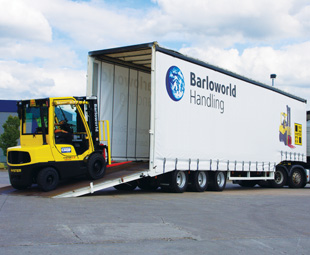Management: a weak link in the (supply) chain?

Rapid change is a permanent feature in the economy. This is highlighted in the 12th supplychainforesight study – released by Barloworld Logistics. With new technologies, cut-throat competition and competitive ecosystems, the ability to make key shifts and transform from within is becoming essential for survival.
The study, which is entitled: Embracing Change for a Sustainable Future, reveals that most organisations are poorly equipped to anticipate major market shifts and adapt accordingly. “The greatest obstacle is to change people,” explains Kate Stubbs, executive of marketing and communications at Barloworld Logistics. “Leaders are required to create the context and environment for change in order to effect change seamlessly and successfully.”
Based on independent research conducted by the consulting firm Frost & Sullivan, on behalf of Barloworld Logistics, the report gathered the views of over 370 professionals representing companies across South Africa.
More than two-thirds (66 percent) of the respondents hold a director-level position, demonstrating the relevance that supply chains play in business today. Respondents to this year’s survey represented a broad variety of companies by size; ranging from those turning over R1 billion or more per annum, through to smaller entrepreneurial businesses with a turnover of less than
R50 million.
“Given its unique scope and depth, the survey offers an important view of how leaders are dealing with massive shifts in the local and global environment,” explains Stubbs.
“Many companies are poorly equipped to deal with change and are often caught flat-footed,” she adds. “They are always behind the curve and are forced to catch up with, and react to, trends – at great cost.”
Those companies that can’t adapt risk losing everything to those that can. Strong and visionary leadership is essential for tackling and managing change. It should be viewed as a strategic process, with a clear and comprehensive picture of the objective and reasons behind it. An embedded system of constant communication and planning should also be present.
Stubbs adds that one of the study’s most important findings was an impending shortage of leadership, visionary and change-management skills within organisations. “While in all the previous supplychainforesight surveys, the lack or shortage of skills has been viewed as a major business constraint, it is the first time that a lack of necessary leadership and visionary skills has been identified as a skills gap at managerial level.”
Embedding change management
Barloworld Logistics points out that, in many organisations, change management is mishandled. Companies typically establish a team to implement predetermined changes. This team is usually not involved in the monitoring of the need for change, nor does it have the vision relating to what needs to change and why. It operates on an ad hoc basis, without a consistent and established strategy.
 This is a fundamental strategic error. Managing change is essentially an executive function, which requires the support and input of all those affected by it. Instead of handing the issue to one team, change needs to be a permanent item on the executive agenda. It is encouraging to note, however, that businesses are becoming aware of the need to prioritise change management and approach it differently.
This is a fundamental strategic error. Managing change is essentially an executive function, which requires the support and input of all those affected by it. Instead of handing the issue to one team, change needs to be a permanent item on the executive agenda. It is encouraging to note, however, that businesses are becoming aware of the need to prioritise change management and approach it differently.
Respondents in the supplychainforesight study ranked the ability to anticipate change and adapt quickly as their second top-ranked business constraint. When coupled with the highest-ranking business objective of identifying and managing change, this clearly highlights the acknowledgement that change is disrupting the way companies operate.
On a similar note, respondents ranked the top supply chain challenge as the willingness to change, thereby breaking old habits or relationships, which is invariably a leadership, management or communication issue. It would appear that it is less about the willingness to change than it is about the identified and articulated need to do so.
Indeed, the issue may well be identifying the need to change before being forced to do so by circumstances – which relates to the required executive function of seeking and anticipating change for continuous improvement.
In addition, there appears to be little confidence in the ability of organisations to identify and respond to trends. Only 42 percent of survey respondents said their organisations are constantly in touch with anticipated shifts in the market and predicting game-changing trends.
With regard to capabilities to implement change within organisations, 45 percent of respondents believe it is well executed, but needs improvement. Only seven percent responded that it is extensive and comprehensive.
“With these activities being vital to the success and sustainability of businesses, the lack of competence is a worry,” adds Stubbs.
The right skills
Identifying and anticipating change is a specific skill that needs to be present within leadership teams, along with the ability to manage change. Increasingly, these skills are found to be rare – if not entirely absent – within many management teams.
The lack of relevant skills was a key element of concern among respondents, and reflects a sentiment that has been expressed for several consecutive years. Yet, this year the response indicated that the concerns regarding skills shortages could be related to the lack of visionary leadership and the need for change management skills – and not purely to the vocational skills of the workforce and lower level management, as previously stated.
Few could argue that investment in skills and expertise is the best approach for long-term business success. Today, the skills required are different – and businesses need to recognise this.
Forward-thinking organisations need to identify what skills they have, understand the trends that will impact the business, and then identify the types of skills and abilities they will need in future to best adapt to and evolve with market shifts.
“Without doubt, organisations that build up management expertise in the area of identifying and managing change will be best positioned to leverage new trends and opportunities – and enjoy sustainable, long-term growth,” concludes Stubbs.
Published by
Focus on Transport
focusmagsa




